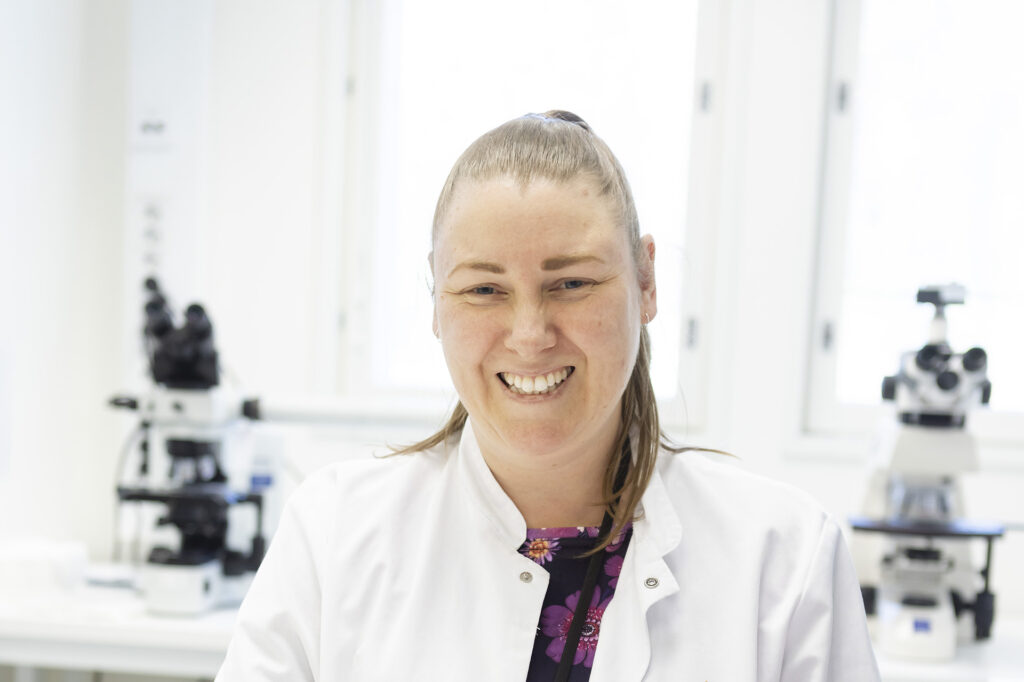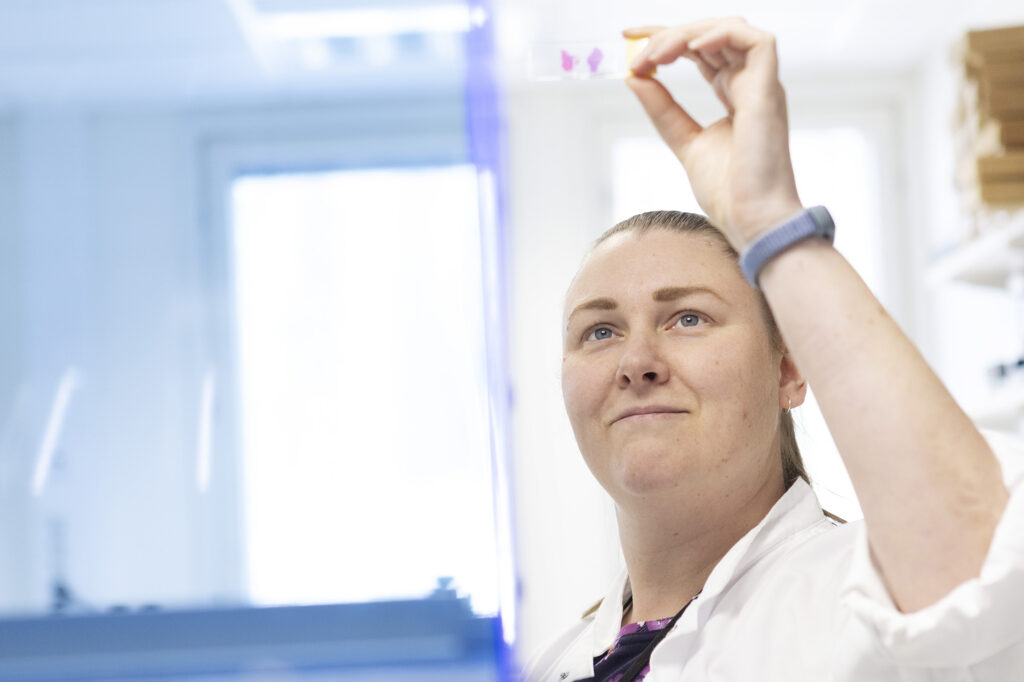A biochemist investigating brain disease
The path of Eloise Mikkonen, originally from Australia, to becoming a researcher has been complicated by funding problems and an ADHD diagnosis that she only received as an adult. Her positive attitude, ability to laugh at herself and extensive support network have helped her overcome difficult times.

When Eloise Mikkonen began working on her doctoral dissertation on Alzheimer’s disease at the University of Tampere, she thought that a cure for the disease was very close to being discovered. Now, 17 years later and as a post-doctoral researcher, she knows that Alzheimer’s is still a profound mystery that research has not been able to solve. Alzheimer’s is a type of dementia which progressively degenerates the brain.
Eloise Mikkonen still hopes that she can advance the research of neurodegenerative diseases and find a factor, or factors that would at least help slow down the gradual degeneration of nerve cells. In addition to Alzheimer’s, she researches Parkinson’s disease, Lewy body dementia, tauopathies and other degenerative brain diseases.
“One day, I hope to find the answers to questions about the main causes of these common brain diseases. The specimens that I work with might reveal those answers.”
To Finland by chance
Eloise Mikkonen studied biochemistry at the Swinburne University of Technology in Melbourne. She had originally dreamt of becoming a photographer, but switched last minute realising her interest in science might provide a better career path. After completing her degree, as part of the IAESTE exchange programme, she went first to Denmark and then the Czech Republic, where she undertook research and met some Finnish exchange students.
Eloise Mikkonen learnt that it is worth seizing opportunities when they present themselves, even at the risk of failure. Passion, networking and friendships are important not just for one’s happiness, but also for building one’s identity and finding one’s own areas of interest.
To look for universities to do a doctorate at, Eloise Mikkonen emailed universities in countries where she had friends or family. She received one affirmative response. It came from the University of Tampere.
“I only planned to do my doctorate in Finland, but I met my ex-husband, we had kids, and I stayed here. I’d created a strong support network of friends here. Even though life is difficult sometimes, I can’t see myself living anywhere else.”
Unique research material
Eloise Mikkonen lives in Tampere and works as a full-time self-funded post-doctoral researcher at the Department of Pathology at the University of Helsinki. She investigates the brain damage generally linked to various dementia disorders in an internationally unique forensic autopsy cohort, who died outside hospital.
“This provides a unique opportunity to study the early mechanisms that could lead to neurodegenerative diseases. They aren’t usually observed when someone’s still alive.
“I work with neuropathologists and have acquired the professional expertise that allows me to make use of brain specimens.”
In addition to her research, Eloise Mikkonen is responsible for funding applications. She speaks about her research findings in Finland and at international conferences, with the aim of creating the opportunities for collaboration and new research ideas.
Exciting variety of work
Eloise Mikkonen likes that her work is varied and affords her the opportunity to use her creativity through various channels. Last year, she was diagnosed with ADHD.
ADHD presented itself in Eloise Mikkonen as procrastination and a difficulty with starting tasks when she didn’t find them engaging. She struggled to complete tasks and projects and sometimes felt herself an impostor who did not deserve the credit for her work. The problems became apparent after she had her children.
“When I became a mum, I found it hard to focus on my work, which is probably one reason my career ended after my doctoral degree.”
The medication she began taking after her diagnosis raised her irritation threshold and made concentration easier. That made a big difference at work and in her personal life.
Eloise Mikkonen’s children live at her place every other week, which makes combining her work and family life easier. When the children are with their father, she prioritizes her work. When the children are with her, she focuses more on them.
Crowd-funded research
After she earned her doctorate, Eloise Mikkonen continued her research doggedly, even though she only got funding for a few months at a time. She secured funding for dementia research through international crowd-funding, a rare achievement.
She found the process interesting. Eloise Mikkonen enjoyed presenting her research findings to a general public audience. She also found it interesting to look at research from a business perspective. That aroused a lot of interest in the scientific community and saw Eloise Mikkonen nominated for a scientific communication award.
Unfortunately, the crowd-funding only generated two months of funding, barely more than the short contracts signed with collaborative partners. Large funding organisations were not interested.
Constant financial insecurity and living under pressure have given Eloise Mikkonen flexibility and stamina. She has learnt to accept things not always going to plan.
“My strength is keeping my positive attitude in the face of endless negative outcomes. I’ve also learnt to make alternative plans to keep myself from ending up in dead ends.”

Aiming for docent
Alongside her research, Eloise Mikkonen supervises students. When she was unable to secure research funding, she did other jobs, including teaching English in primary schools. She also started up and runs a side business, organising science clubs and parties for children. She has also worked as a freelance Finnish–English translator and edited scientific texts and publications in English.
“My Finnish is good enough to get by in daily life.”
Eloise Mikkonen has also completed vocational teacher training. She is now working as a researcher full-time and intends to apply for the title of docent this year.
Eloise Mikkonen, 41
- Graduated from Lilydale High School, Victoria, Australia, 2000
- B.Sc. Hons, Swinburne University of Technology, Melbourne, Victoria, Australia, 2005. Biotechnology and biochemistry.
- Doctor of Philosophy (Molecular Biology and Forensic Medicine), University of Tampere, 2011. Thesis topic: Alzheimer’s disease neuropathology and inflammation.
- Vocational teacher training, Tampere University of Applied Sciences, 2021.
- Employment history: Walter and Eliza Hall Institute of Medical Research (Australia), Commonwealth Scientific and Industrial Research Organisation (CSIRO, Australia), Novo Nordisk (Denmark), Brno Veterinary Research Institute (Czech Republic), University of Tampere, Fimlab, City of Tampere, Lionbridge, Huslab, University of Helsinki.
Timeline
- 2007 Came to Finland as a doctoral student studying Alzheimer’s disease.
- 2011 Completed doctoral thesis.
- 2017 Joined the Loimu mentoring programme and investigated new opportunities.
- 2020 Began part-time post-doctoral research work at Huslab.
- 2023 Found independent funding for own research. Independent academic career begins to take shape.

